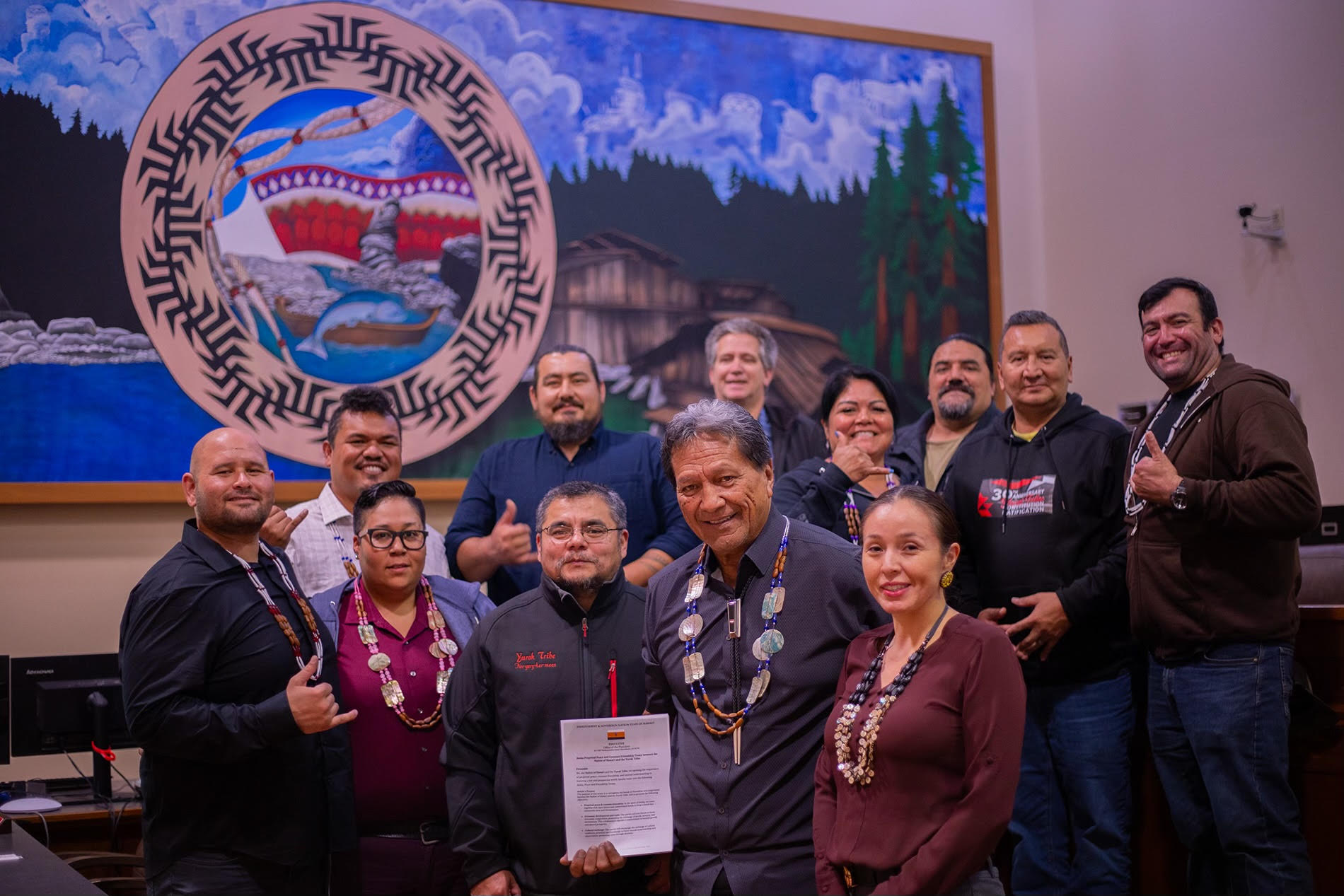
- Details
- By Darren Thompson
The Nation of Hawai’i and the Yurok Tribe announced on Monday a historic ratification of a Peace and Friendship Treaty between the two sovereign nations that signifies friendship and improving their respective nations.
The treaty is aimed to promote trade, tourism, and investment to enhance the prosperity and well-being of both nations, the Nation of Hawai’i’s Foreign Minister John Garcia said to Native News Online. Both nations will engage in cultural exchange programs, fostering a deeper appreciation and understanding of each other's heritage.
“This monumental achievement signifies a remarkable milestone in the journey toward building connections, fostering international relations, and recognizing nation-to-nation cooperation,” said Nation of Hawai’i in a press release on Monday, October 16, 2023. “The treaty exemplifies the spirit of Aloha, unity and mutual respect between two sovereign nations, each with a unique heritage and identity.”
The Yurok Tribe treaty is the second ratified treaty between the Nation of Hawai’i and a federally recognized tribe.
Native News Online reported in January 2023, the Nation of Hawai’i’s first treaty of peace and friendship was ratified with the Timbisha Shoshone Tribe on their lands near Waimanalo, Hawai’i. The treaty began the effort of the Independent & Sovereign Nation of Hawai’i to sign treaties with all 574 federally recognized Native American tribes and unrecognized tribes to form the Aboriginal Indigenous Native Alliance (AINA).
AINA is a coalition of Aboriginal, Indigenous, and Native peoples from around the world, united by a shared vision of world peace and a commitment to preserving the land and cultural heritage of their respective nations.
“This treaty symbolizes the hope for a better future, one where aboriginal, Indigenous and Native Nations can come together, share their traditions, protect their natural resources, and work towards prosperity,” President of the Nation of Hawai’i, Pu’uhonua Dennis “Bumpy” Kanahele said in a statement. “We are proud to be part of this historic moment.”
The Peace and Friendship Treaty, the first of its kind with the Yurok Tribe, and embodies the collective commitment to peaceful coexistence, cultural exchange, environmental protection, and economic development the Nation of Hawai’i said. “The treaty exemplifies the spirit of Aloha, unity and mutual respect between two sovereign nations, each with a unique heritage and identity,” the Nation of Hawai’i said when announcing the ratification of the treaty.
“Through this treaty, the parties are committed to exploring opportunities for economic growth and cooperation.”
Yurok’s Tribal Chairman, Joe James, said that the tribe is honored to partner with the Nation of Hawai’i.
“We are really excited about the opportunities and the doors that will open up for us, as we aim to strengthen the bonds between our nations and collaborate on issues of mutual importance,” Chairman James said in a statement.
The treaty also calls on both nations to recognize the significance of safeguarding the environment, including protecting natural resources, preserving biodiversity, and mitigating the effects of climate change. Both nations will make efforts to address environmental concerns that impact both nations.
“The Peace and Friendship Treaty between the Nation of Hawai'i and the Yurok Tribe is a testament to the power of diplomacy, cooperation, and the shared values that unite us all. It is a beacon of hope, pointing toward a brighter future for Indigenous nations everywhere,” het Nation of Hawai’i said.
More Stories Like This
NCAI Passes Two Emergency Resolutions on Immigration Enforcement ActivitiesChickasaw Lighthorse Police Officer named Indian Country Law Enforcement Officer of the Year
Indian Gaming Association Rallies Broad Coalition Against Sports Event Contracts It Calls Illegal Threat to Tribal Sovereignty
Navajo Resources and Development Committee Issues Notice on Livestock Inspection Requirements
American Prairie, Tribal Coalition Files Protest Over Rescinded Grazing Rights
Help us defend tribal sovereignty.
At Native News Online, our mission is rooted in telling the stories that strengthen sovereignty and uplift Indigenous voices — not just at year’s end, but every single day.
Because of your generosity last year, we were able to keep our reporters on the ground in tribal communities, at national gatherings and in the halls of Congress — covering the issues that matter most to Indian Country: sovereignty, culture, education, health and economic opportunity.
That support sustained us through a tough year in 2025. Now, as we look to the year ahead, we need your help right now to ensure warrior journalism remains strong — reporting that defends tribal sovereignty, amplifies Native truth, and holds power accountable.
 The stakes couldn't be higher. Your support keeps Native voices heard, Native stories told and Native sovereignty defended.
The stakes couldn't be higher. Your support keeps Native voices heard, Native stories told and Native sovereignty defended.
Stand with Warrior Journalism today.
Levi Rickert (Potawatomi), Editor & Publisher

